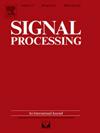Total complex kernel risk-sensitive loss for robust DOA estimation
IF 3.4
2区 工程技术
Q2 ENGINEERING, ELECTRICAL & ELECTRONIC
引用次数: 0
Abstract
Adaptive filtering-based approaches have been proposed for low-complexity direction of arrival (DOA) estimation. Nonetheless, existing methods demonstrate significant performance deterioration in bias compensation models that incorporate impulse noise. To address this challenge, we have introduced a novel similarity measure in kernel space, termed total complex kernel risk-sensitive loss (TCKRSL), which effectively extracts higher-order statistics from the data to mitigate the detrimental effects of outliers caused by impulse noise. Subsequently, we derived a robust adaptive filtering algorithm known as the minimum total complex kernel risk-sensitive loss (MTCKRSL) algorithm based on stochastic gradient descent and applied it to DOA estimation via adaptive nulling array antenna. To further enhance estimation performance, we implemented a variable step size (VSS) mechanism grounded in cumulative instantaneous error and the estimated signal power aimed at balancing the trade-off between steady-state error and convergence speed, resulting in the VSS-MTCKRSL algorithm. Additionally, the convergence properties and computational complexity of the proposed algorithm were analyzed elaborately. Simulation results across various performance metrics demonstrate that the proposed VSS-MTCKRSL algorithm outperforms the state-of-the-art algorithms regardless of the presence of impulse noise or Gaussian noise.
鲁棒DOA估计的总复核风险敏感损失
提出了一种基于自适应滤波的低复杂度到达方向估计方法。尽管如此,现有的方法在包含脉冲噪声的偏置补偿模型中表现出显著的性能下降。为了解决这一挑战,我们在核空间中引入了一种新的相似性度量,称为总复核风险敏感损失(TCKRSL),它有效地从数据中提取高阶统计量,以减轻脉冲噪声引起的异常值的有害影响。随后,我们推导了一种基于随机梯度下降的鲁棒自适应滤波算法——最小总复核风险敏感损失(MTCKRSL)算法,并将其应用于自适应消零阵列天线的DOA估计。为了进一步提高估计性能,我们实现了一种基于累积瞬时误差和估计信号功率的变步长(VSS)机制,旨在平衡稳态误差和收敛速度之间的权衡,从而产生了VSS- mtckrsl算法。此外,还详细分析了该算法的收敛性和计算复杂度。各种性能指标的仿真结果表明,无论是否存在脉冲噪声或高斯噪声,所提出的VSS-MTCKRSL算法都优于最先进的算法。
本文章由计算机程序翻译,如有差异,请以英文原文为准。
求助全文
约1分钟内获得全文
求助全文
来源期刊

Signal Processing
工程技术-工程:电子与电气
CiteScore
9.20
自引率
9.10%
发文量
309
审稿时长
41 days
期刊介绍:
Signal Processing incorporates all aspects of the theory and practice of signal processing. It features original research work, tutorial and review articles, and accounts of practical developments. It is intended for a rapid dissemination of knowledge and experience to engineers and scientists working in the research, development or practical application of signal processing.
Subject areas covered by the journal include: Signal Theory; Stochastic Processes; Detection and Estimation; Spectral Analysis; Filtering; Signal Processing Systems; Software Developments; Image Processing; Pattern Recognition; Optical Signal Processing; Digital Signal Processing; Multi-dimensional Signal Processing; Communication Signal Processing; Biomedical Signal Processing; Geophysical and Astrophysical Signal Processing; Earth Resources Signal Processing; Acoustic and Vibration Signal Processing; Data Processing; Remote Sensing; Signal Processing Technology; Radar Signal Processing; Sonar Signal Processing; Industrial Applications; New Applications.
 求助内容:
求助内容: 应助结果提醒方式:
应助结果提醒方式:


